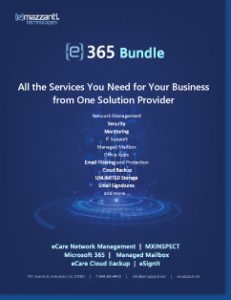By Joseph Anthony
Reprinted with permission from Microsoft Small Business Website
The U.S. tax code is so complicated that it’s no surprise many small businesses and individuals make mistakes in their bookkeeping and filing.
But don’t count on any mercy from the IRS.
Take it from a tax professional. Here are five of the more common mistakes, and what you need to do to avoid them.
1. Not saving receipts of less than $75. People sometimes get excited when they hear that the IRS doesn’t require receipts for meal and entertainment expenses of less than $75. Don’t fall into this trap. You may not need the receipt, but you still need to have some sort of record documenting where you went, when you went there, who you were with, the business purpose of the meal or entertainment and the business relationship between you and the people you were with. When you look at the list of requirements, what could be better for documentation than a credit-card charge receipt? In most cases, the charge slip will already have printed on it the name and address of the restaurant and the date and time you were there. All you have to do is write on the slip who you were with and what the business relationship and purpose was of the event. While a receipt may not be required, for many people hanging onto the receipt is going to be easier than keeping an entirely separate log of the expense information.
2. Lumping equipment with supplies. Equipment is a capital expenditure, and capital expenditures have to be depreciated. Special rules do allow most small businesses to write off up to $24,000 in capital expenditures for tangible personal property (such as computers and office furnishings) in the year it is purchased. However, you still have to report these purchases as capital expenditures and elect to use this special method of expensing the costs. What if you don’t report the purchases properly and instead just deduct your computers and other capital items as supplies? The IRS could rule that you improperly characterized the expense and are not entitled to the deduction you claimed. Not only that, but since you failed to properly categorize the property or make an election, you could also find that you’re required to add the cost of the property to your overall investment in your business. Result: no current deduction at all.
3. Forgetting to track reimbursable expenses. Many small-business owners pay for some business expenses with cash out of their own pocket or through a personal credit card. That’s fine. The mistake is if they don’t track those costs and submit the expenses to their company for reimbursement. Also, the company must have an established plan that does deduct the expenses and enables reimbursements to be nontaxable to employees. But if you don’t keep track of and substantiate the expenses, you will at best have a non-reimbursed business expense. These can be deducted on your personal tax return only to the extent that all of your miscellaneous Schedule A expenses exceed 2% of your adjusted gross income.
4. Miscalculating automobile deductions. Part of the problem here is that there are many ways to calculate deductions for business use of a car.
5. Giving more than you can receive, tax-wise. It seems like every year I see at least one small business saying that it had a couple thousand dollars in deductible business gifts in the previous year. Now, I have no problem with gifts to clients and business associates. But a four-figure deduction for gifts gets my attention, because the IRS allows us to deduct only up to $25 worth of gifts to any individual per year. So $2,000 in deductions would mean that gifts were given at least 80 different people. That’s a lot of gifts. Usually it turns out that while the money was indeed spent, it was divided into several gifts that were more than $25 apiece. There’s nothing wrong with being generous. But only that first $25 per recipient is a deductible business expense. The rest is a nondeductible expense. Sometimes it does seem as if no good deed goes unpunished.












